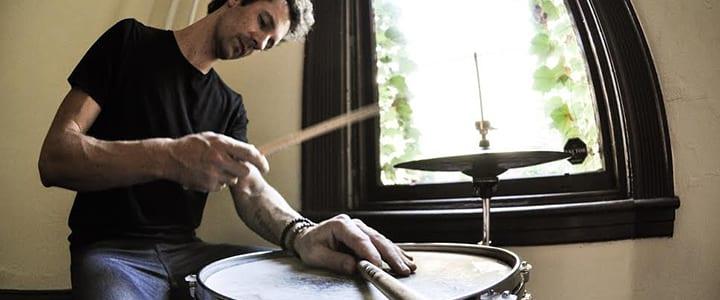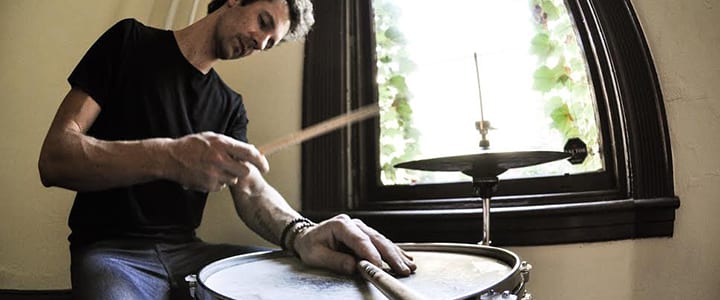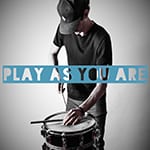Every drummer has to start somewhere, and every experienced drummer remembers what it was like to be a beginner. In our Drummers Stick Together series, veteran drummers share their personal stories of learning drums, developing their craft, and following their dreams!
George Beck is a touring drummer and drum teacher. He played with his first band when he was 14, and he is now the drummer for Philadelphia-based singer/songwriter Katie Barbato and Dirty Holiday. George, a.k.a Beckbeat, recently published his first book “Play As You Are: A Collection of Essays – Picking a Drummer’s Mind”.
We caught up with Becks to discuss music, drumming, and his new book.
You started playing with your first band at 14, what was it like to be part of a band at such a young age — not only developing your skills as a drummer, but learning to mesh with a band? How did this experience affect your future as a musician?
I consider myself lucky to have started playing in a band at a fairly young age. First and foremost, it was all about friendship and having fun. The great thing about being young is that there’s no tendency to overthink or overanalyze. We just played together and kind of figured it out along the way.
I remember that the focus was really on making music together and listening to each other. We would jam on parts and play around with them. This is how I first experienced what it means to lock in with a bass player, and to craft a simple groove as a rhythm section, not just playing along next to each other.
I’ve always enjoyed singing, and I ended up doing lead vocals on some of our songs. Again, it kind of happened organically — it was just a fun thing to do. Today, I’m grateful for that experience because I usually don’t struggle with singing background while drumming. I don’t know if I would feel as comfortable singing if it weren’t for my first band.
It taught me the importance of listening and the power of working and creating something together; the collective creative process.
You came from a musical family, how did this influence your personal musical journey? Were you able to share your passion and early experience with your family?
There was always music in the house. My grandparents would listen to Austrian folk music all day on the radio. My dad was an avid singer and a fixture in the church choir. We had an old, often out-of-tune piano in the living room, and my two older brothers and I were encouraged to take piano lessons.
My parents were supportive of my drumming. They were generally supportive of my drum lessons and music making with my friends, but never showed much interest in my musical endeavors per se. They were busy people at that time, and the music was way too “rock ‘n’ roll” for them, I guess.
I think the first time they realized that I was serious about playing music was when I sent my dad to pick up my high school diploma because I was busy sound checking for a gig.
What have you learned from touring and playing with other musicians? How has this helped you become a better drummer and band member?
Working with artists from different genres expands your musical horizons, you learn so much, if you’re willing and open to learning.
I once worked live with musicians from Turkey (the band Coup De Bam). We mixed Turkish folklore themes with down tempo electro beats. It was very interesting and challenging to take a piece in 5/4 or 9/8 and make it “dancey” (in the modern sense of the word), and figure out parts that would pay tribute to the folklore tradition as well as to the modern-beat style.
Trying to adjust to a new musical situation and listening to the artists’ needs can be challenging, but this is how I grow. I bring all I’ve got to the table and learn to work with what I have.
A lot of the people I’ve been lucky to work for inspired me, not only with their music, but even more so with their attitude. For example, I once worked with a singer who would always give his best and perform every gig as if he were playing Yankee Stadium, even if there were only five people in the audience. I remember thinking: “this is how you do it”.
How have your own experiences as a drummer influenced or changed the way you teach your students?
When I started to teach many years ago, I thought every student had to follow the same path–MY path/MY framework of learning. Needless to say, I had many frustrated students, and I ended up frustrated, too!
I totally abandoned that approach, and now, I focus on the students’ needs and goals. It’s not about what I can do, it’s about what I can give.
As a drummer in a band, you work for the band. As a teacher, you work for the student. It’s about the drum students, not me. Everybody’s different. All my students have different personalities, preferences, learning abilities, skill sets, and goals for playing the drums. Therefore, as a teacher, it’s my responsibility to put the student first and adjust my teaching style to him/her.
You just finished writing your first book “Play as You Are”, was this something you’ve always aspired to do, or did the opportunity just present itself?
I never seriously thought about writing a book. I enjoy teaching a lot, and some of the stuff in the book was inspired by my reflections on certain lessons, or remembering my own struggle in becoming a drummer.
I just started writing short essays, most of them on my phone when I had time to kill, and later, decided to compile them into a book; that’s really it.
I love how you say that making music doesn’t start with your drum sticks, but with your desire or compulsion to make music. Can you talk about how it’s not just about what you play or what you practice, but about really going after your passion?
In the book, I talk about how you can do whatever you want, but you can’t choose your wants. I never decided to play the drums. Sure, I can make up all kinds of stories and theories about why I ended up playing drums and not the violin, but the truth is, I don’t know.
There’s an unexplainable desire to play the drums, and starting out, I sensed an urge to follow that lead! It’s very tempting to take the “I’m a drummer concept” and turn it into a competitive mind game, a competition with other drummers, other musicians, and with yourself.
For me, the passion to play is my true desire. It often gets buried or covered up in aforementioned concepts. I’m all about putting the passion to play first. Music (and drumming) is an art form and it’s about expressing yourself. In my opinion, you have to start there, or more accurately, go back there.
You say your book is an invitation to explore a different approach to playing music. How is it different and why is it successful?
The approach is different because it directs the attention back to yourself. It’s not a book of answers, it’s a book of questions. I’m convinced that in order to become the best player you can be, you have to ask those questions of yourself. And only you can answer them.
This approach can shine a light on your assumptions and beliefs, when it comes to playing the drums or being a creative person in general.
Here’s a quote from the book I’d like to share with you:
“…before I sit down to practice, I ask myself two simple questions: ‘What am I going to practice?’ and ‘Why am I going to practice it?’ It doesn’t matter if you are a professional drummer, a weekend warrior, or are happy drumming along to your favorite songs in the basement. The clearer your answers to these two questions, the easier and more enjoyable your practice sessions will become…”
Special thanks to Becks for taking time to chat with us, and sharing his insight and wisdom. Check out his website to learn more about his book and listen to his music!
Follow your dreams and start learning drums today. Search here for a drum instructor near you!
Maile Proctor



